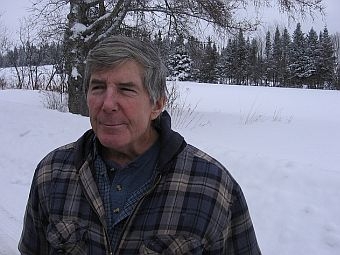 (Host) Northeast states are increasingly looking to Canada to meet a growing demand for low-cost hydroelectricity from renewable sources. Governor Peter Shumlin talked about increasing Vermont’s imports during a recent trip to Quebec.
(Host) Northeast states are increasingly looking to Canada to meet a growing demand for low-cost hydroelectricity from renewable sources. Governor Peter Shumlin talked about increasing Vermont’s imports during a recent trip to Quebec.
But the energy imports are stirring controversy. In northern New Hampshire, local activists are fighting a power line that would send the electricity south. And questions are being raised about whether big hydro is really green.
As part of a collaboration of Northeast public radio stations, VPR’s John Dillon reports.
(Dillon) John Harrigan is a retired newspaper publisher who now writes columns for several New Hampshire papers.
He’s driving his pick up down a quiet road in Colebrook, New Hampshire. Snow-covered trees drape low, forming a kind of white tunnel.
He pulls over and points north to Canada.
(Harrigan) "See that square field way up there? On the far ridge? As I understand it, the power line would come just to the left of that."
(Dillon) Harrigan is part of a coalition of environmentalists, local businesses and outdoors enthusiasts that’s fighting a proposed 1,200 megawatt power line designed to carry electricity from Quebec to Northeast states.
(Harrigan) "What’s being threatened is the only thing we really have left, which is tourism. All for the convenience of people far to the south. And we’re going to wind up with this huge scar right down through the narrowest and most fragile part of New Hampshire."
(Dillon) But utilities in many Northeast states face mandates to include a certain percentage of renewable energy in their portfolios. And they see Hydro-Quebec as helping fill that need. Kenneth Bowes is with Connecticut Light and Power, which is owned by Northeast Utilities.
(Bowes) "We think it is essential for meeting the renewable portfolio standards for New England and we think it is a direct benefit to customers for cost and also a huge impact on carbon emissions and the environment."
(Dillon) But in northern Quebec, Roger Orr has a different view. Orr’s home, about 500 miles north of Montreal, is a sparsely populated land of big rivers and spruce forests. The water flows west to James Bay. And Hydro-Quebec has become the continent’s largest producer of electricity by taming the rivers with huge dams. Orr, a member of the Cree nation, lives near one of them on the Rupert River.
(Orr) "After they dammed it, after they closed the gates, the water went down dramatically. It was from a pristine river down to a river that hardly even trickled any more."
(Dillon) Orr doesn’t think Hydro-Quebec electricity should be labeled as renewable when it’s sold in the United States.
(Orr) "If I was to go and build a dam in New York state, oh man, they would see first hand what it is, that they’re saying it’s renewable and green energy? No, no. The environment is suffering."
(Dillon) In the world of utility regulation, the word "renewable" has a legal meaning. If a project is deemed renewable, it helps utilities meet those requirements that a certain percentage of their portfolios come from greener sources, such as wind or solar.
Vermont has already designated electricity from Hydro-Quebec as renewable. The government-owned utility hopes other Northeast states follow suit. Here’s Quebec Premier Jean Charest at a news conference last summer announcing a new power deal with Vermont.
(Charest) "The state of Vermont is the first state in North America to not discriminate against large-scale hydro. And that will help us inspire other legislatures and hopefully the federal government of the Untied States to do the same."
(Dillon) But environmental groups are concerned imports from Hydro-Quebec could stifle development of renewable energy closer to home, such as wind and solar.
The utilities argue hydro from Canada will significantly reduce the region’s greenhouse gas emissions. Martin Murray of Northeast Utilities is a spokesman for the Quebec-New Hampshire power line project.
(Murray) "We have some pretty lofty goals in terms of lowering future emissions of carbon."
(Dillon) And the federal government has also announced it will regulate greenhouse gas pollution. Concerns over climate change may have the upper hand in the environmental debate over Hydro-Quebec.
For VPR News, I’m John Dillon.
Note: Northeast environmental reporting is made possible, in part, by a grant from United Technologies.